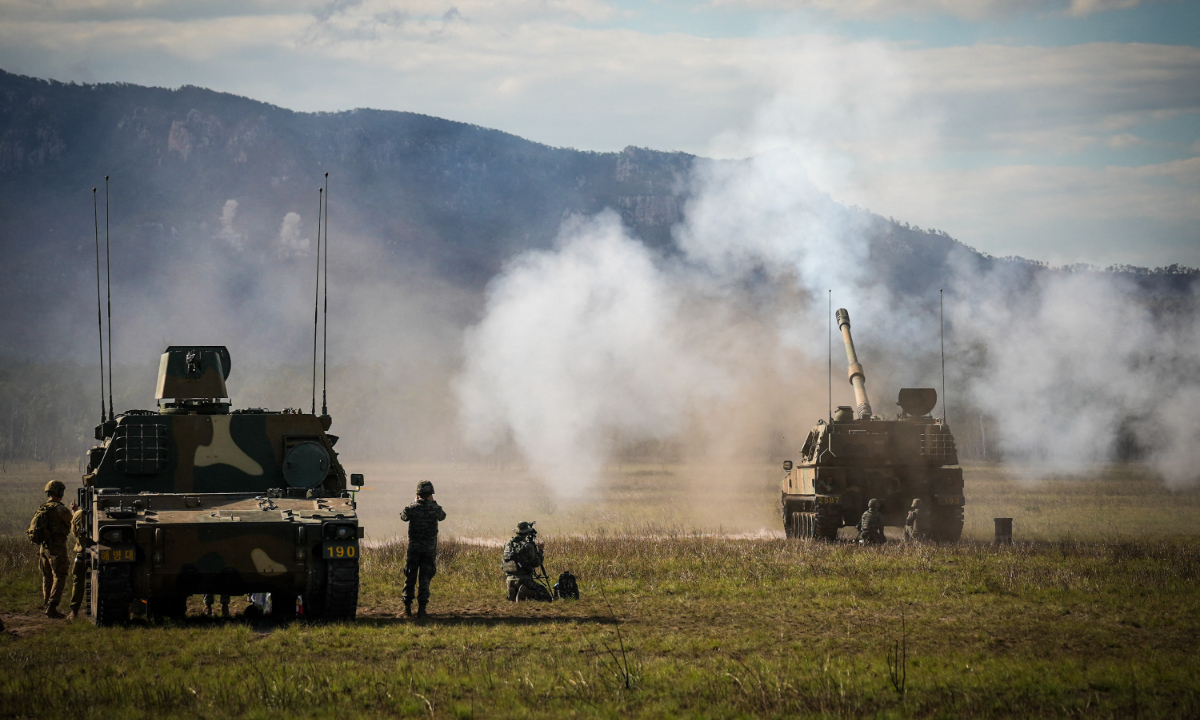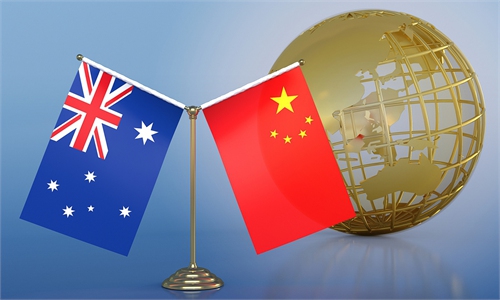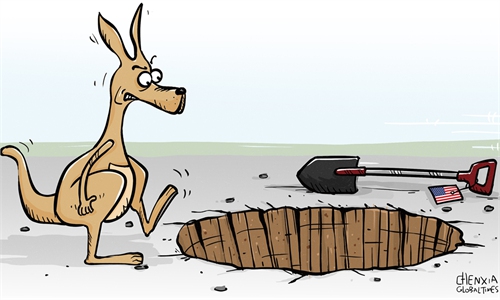Analysts warn multibillion navy overhaul 'irrational and dangerous' as Australia eyes largest navy buildup since WWII

Artillery is fired during joint military drills at a firing range in northern Australia as part of Exercise Talisman Sabre, the largest combined training activity between Australia and the US, in Shoalwater Bay, Australia, on July 22, 2023. Photo:AFP
Australia on Tuesday announced a multibillion overhaul of its navy, claiming it is responding to "increasing geostrategic uncertainty." Chinese analysts criticized the plan as being "irrational and dangerous" as it neither matches Australia's real needs in geopolitics nor its economic capability. They warned that the assertive plan may trigger an arms race and deal a blow to the security and stability of Australia as well as the whole Asia-Pacific region.
According to a CNN report, Australia on Tuesday unveiled plans to build its largest navy since World War II, allocating more than $35 billion for the defense project over the next 10 years, a move analysts said pointed to heightened tensions with China in the Asia-Pacific.
Australian Defense Minister Richard Marles said the government's plan would eventually increase the navy's surface combatant fleet from 11 to 26 vessels, the largest naval complement since the end of WWII.
Those surface vessels will join a fleet of nuclear-powered submarines Australia plans to build under the AUKUS pact with the US and the UK, the first three of which are expected to be delivered early next decade, Reuters reported on Tuesday.
Reuters reported that the government's defense strategic review out last year said that intense competition between the US and China is defining the Pacific region, and that the major power competition had "potential for conflict."
Australian naval forces are outdated and relatively weak within the entire Australian military, so as a maritime nation, it has been emphasizing the need to increase the naval budget for the past few decades, analysts said.
But this time, the increase can be considered quite significant, Chen Hong, director of the Australian Studies Center at East China Normal University, told the Global Times on Wednesday.
He explained that currently, Australia's military expenditure stands at 2 percent of its GDP, and if this increase is sustained over the next decade, overall military spending will be much higher.
Considering it is an island nation surrounded by oceans in the South Pacific region, Australia's geographical location provides the country with a certain level of security compared to many other countries, Chen said. "Making this surge in military spending is not in line with the country's geopolitical reality. This is excessive," the expert noted.
It is notable that the demands for a defense budget increase come from pressure from the US, analysts believe.
In recent years, the US has been consistently urging its allies, especially NATO allies and other partners, to increase defense spending, but with less than half actually responding, Chen pointed out. Additionally, the US strategy consistently includes South China Sea issues and the Taiwan question as important aspects of its strategic pressure, coercion and provocation against China, with the South Pacific region playing a crucial strategic role in this process.
He said the aggressive defense plan would push Australia to the forefront of the US' anti-China strategy.
On the other hand, the announcement of an increase in defense budget is mainly for the Albanese administration to prepare for the Australian elections next year, analysts said.
With the Albanese administration now in the latter half of its term, his approval ratings have been declining, facing criticism from the opposition and some public opinion for being weak, which is clearly disadvantageous for his reelection next year, Chen remarked.
Therefore, by increasing the defense budget, he is making empty promise to voters.
However, such an ambitious defense buildup can easily trigger an arms race, and with Australia's economy currently stagnating, investing hard-earned economic gains into military spending is risky. Pacific region countries and people will be very wary, according to Chen.
"The Albanese administration is pushing itself into a corner by choosing a very unwise and cost-ineffective approach," Chen said.



